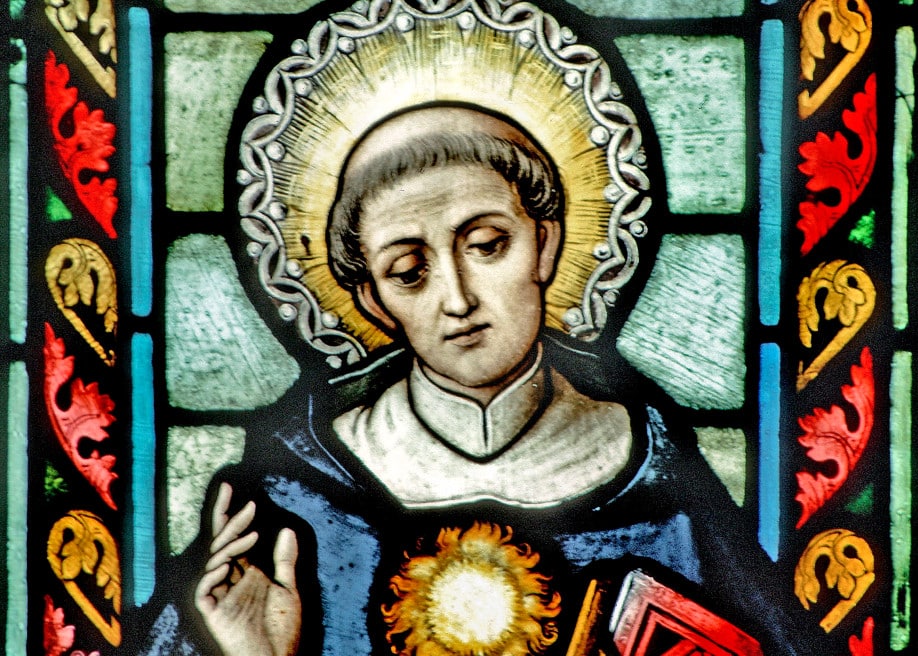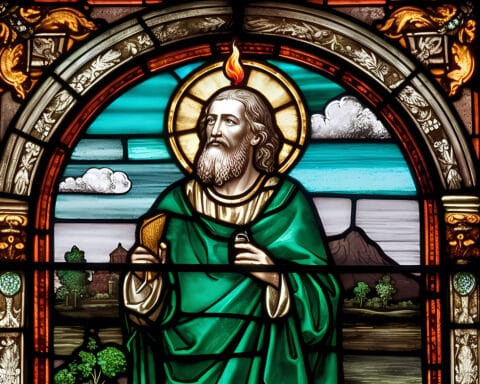The great Dominican theologian St. Thomas Aquinas was canonized 700 years ago, on July 18, 1323, by Pope John XXII. To celebrate St. Thomas’s feast day, observed on Jan. 28, here are 10 quotes to help you better know and love the theology of this Doctor of the Church.
1. On the nature of friendship
“It is of the very nature of friendship that it is not imperceptible; otherwise, it would not be friendship, but merely goodwill. For a true and firm friendship the friends need a mutual love for each other; for this duplication makes it true and firm. Our Lord, wanting there to be perfect friendship among his faithful and disciples, gave them this command of mutual love: whoever fears the Lord directs his friendship aright (cf. Sir 6:17).”
— Commentary on the Gospel of John, c. 13, l. 7
2. Christ’s passion was the most suitable way of delivering us from sin
“That man was delivered by Christ’s passion, many other things besides deliverance from sin concurred for man’s salvation. In the first place, man knows thereby how much God loves him, and is thereby stirred to love Him in return, and herein lies the perfection of human salvation; hence the apostle says: ‘God commendeth His charity towards us; for when as yet we were sinners … Christ died for us’ (Rom 5:8).”
— Summa Theologiae, III, q. 46, a. 3
3. Is God’s mercy opposed to justice? No!
“God acts mercifully, not indeed by going against His justice, but by doing something more than justice; thus a man who pays another 200 pieces of money, though owing him only 100, does nothing against justice, but acts liberally or mercifully. The case is the same with one who pardons an offence committed against him, for in remitting it he may be said to bestow a gift. Hence the Apostle calls remission a forgiving: ‘Forgive one another, as Christ has forgiven you’ (Eph 4:32). Hence it is clear that mercy does not destroy justice, but in a sense is the fulness thereof. And thus it is said: ‘Mercy exalteth itself above judgment’ (Jas 2:13).”
— Summa Theologiae, I. q. 21, a. 3, ad. 2
4. Praying to God versus praying to the saints
“Prayer is offered to a person in two ways: first, as to be fulfilled by him, secondly, as to be obtained through him. On the first way, we offer prayer to God alone, since all our prayers ought to be directed to the acquisition of grace and glory, which God alone gives, according to Psalm 83:12, ‘The Lord will give grace and glory.’ But in the second way, we pray to the saints, whether angels or men, not that God may through them know our petitions, but that our prayers may be effective through their prayers and merits. Hence it is written (Apocalypse 8:4) that ‘the smoke of the incense,’ namely ‘the prayers of the saints ascended up before God.’ This is also clear from the very style employed by the Church in praying: since we beseech the Blessed Trinity ‘to have mercy on us,’ while we ask any of the saints ‘to pray for us.'”
— Summa Theologiae, II-II, q. 83, a. 4
5. Why didn’t Jesus write a book?
“It was fitting that Christ should not commit His doctrine to writing. First, on account of His dignity: for the more excellent the teacher, the more excellent should be his manner of teaching. Consequently it was fitting that Christ, as the most excellent of teachers, should adopt that manner of teaching whereby His doctrine is imprinted on the hearts of His hearers; wherefore it is written (Mt 7:29) that ‘He was teaching them as one having power.’ And so it was that among the Gentiles, Pythagoras and Socrates, who were teachers of great excellence, were unwilling to write anything. For writings are ordained, as to an end, unto the imprinting of doctrine in the hearts of the hearers.”
— Summa Theologiae, III, q. 42, a. 4
6. It is natural to know that God exists
“To know that God exists in a general and confused way is implanted in us by nature, inasmuch as God is man’s beatitude. For man naturally desires happiness, and what is naturally desired by man must be naturally known to him. This, however, is not to know absolutely that God exists; just as to know that someone is approaching is not the same as to know that Peter is approaching, even though it is Peter who is approaching; for many there are who imagine that man’s perfect good which is happiness, consists in riches, and others in pleasures, and others in something else.”
— Summa Theologiae, I, q. 2., a. 1, ad. 1
7. God’s providence directs all things and gives us a role to play in his plan
“Two things belong to providence — namely, the type of the order of things foreordained toward an end; and the execution of this order, which is called government. As regards the first of these, God has immediate providence over everything, because He has in His intellect the types of everything, even the smallest; and whatsoever causes He assigns to certain effects, He gives them the power to produce those effects. Whence it must be that He has beforehand the type of those effects in His mind. As to the second, there are certain intermediaries of God’s providence; for He governs things inferior by superior, not on account of any defect in His power, but by reason of the abundance of His goodness; so that the dignity of causality is imparted even to creatures.”
— Summa Theologiae, I, q. 22, a. 3
8. The Beatitudes are the key to happiness
“Now, one should note that many things are set down here about the Beatitudes; but never could anyone speak so skillfully about the Lord’s words that he could attain to the Lord’s purpose. Yet one should know that all complete happiness is included in these words: for all men desire happiness, but they differ in their judgments about happiness, and for this reason some men desire this, others desire that.”
— Commentary on the Gospel of Matthew, c. 5, l. 2
9. A hymn of praise to the Eucharist
“Godhead here in hiding, whom I do adore,
Masked by these bare shadows, shape and nothing more,
See, Lord, at thy service low lies here a heart,
Lost, all lost in wonder at the God thou art.
“Seeing, touching, tasting are in thee deceived:
How says trusty hearing? that shall be believed;
What God’s Son has told me, take for truth I do;
Truth himself speaks truly or there’s nothing true.”
— From Adoro te Devote, translated by Gerard Manley Hopkins, SJ
10. On heaven
“The desire of the saints to know all things will be fulfilled by the mere fact of their seeing God: just as their desire to possess all good things will be fulfilled by their possessing God. For as God suffices the affections in that He has perfect goodness, and by possessing Him we possess all goods as it were, so does the vision of Him suffice the intellect: ‘Lord, show us the Father and it is enough for us’ (Jn 14:8).”
— Summa Theologiae, Suppl., q. 92, a. 3, ad. 7





